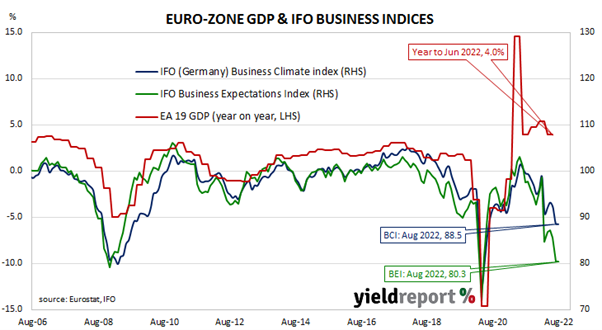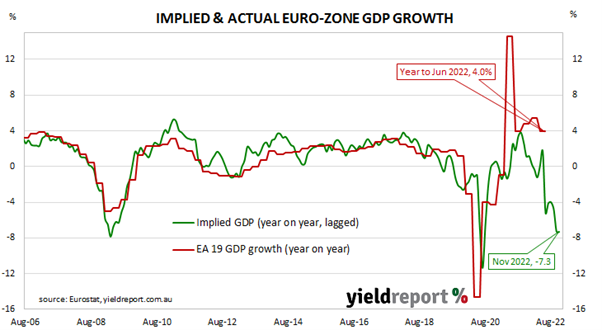Summary: ifo business climate index down again in August, above expected figure; German mood “bleak”, economy expected to shrink in third quarter; current conditions index, expectations index both down; sentiment unlikely to change given energy shortage; expectations index implies euro-zone GDP contraction of 7.3% in year to November.
Following a recession in 2009/2010, the ifo Institute’s Business Climate Index largely ignored the European debt-crisis of 2010-2012, mostly posting average-to-elevated readings through to early-2020. However, the index was quick to react in the March 2020 survey, falling precipitously. Readings through much of 2021 generally fluctuated around the long-term average before dropping away in 2022.
According to the latest report released by ifo, German business sentiment has deteriorated even further, albeit only slightly. August’s Business Climate Index recorded a reading of 88.5, above the consensus expectation of 86.8 but slightly lower than July’s final reading of 88.7. The average reading since January 2005 is just above 97.
“A bleak mood hangs over the German economy,” said Clemens Fuest, President of the ifo Institute. “Uncertainty among the companies remains high, and the German economy as a whole is expected to shrink in the third quarter.”
German firms’ views of current conditions and their outlook both deteriorated. The current situation index slipped from July’s revised figure of 97.7 to 97.5 while the expectations index eased from 80.4 to 80.3.
German and French long-term bond yields both fell noticeably on the day. By the close of business, German and French 10-year bond rates had both shed 6bps to 1.31% and 1.92%.
“Even though the declines were modest, sentiment is still negative and this is unlikely to change for some time given the energy shortage faced by Germany,” said ANZ economist Kishti Sen.
The ifo Institute’s business climate index is a composite index which combines German companies’ views of current conditions with their outlook for the next six months. It has similarities to consumer sentiment indices in the US such as the ones produced by The Conference Board and the University of Michigan.
It also displays a solid correlation with euro-zone GDP growth rates. However, the expectations index is a better predictor as it has a higher correlation when lagged by one quarter. August’s expectations index implies a 7.3% year-on-year GDP contraction to the end of November.



